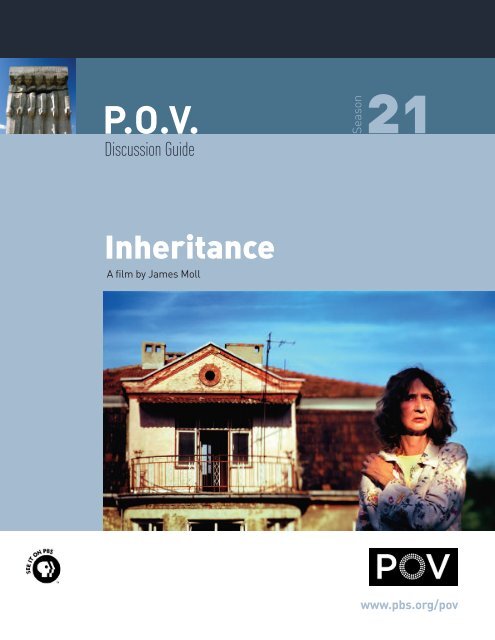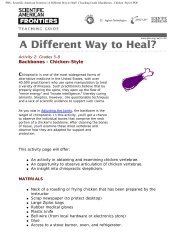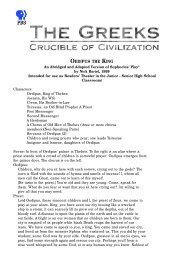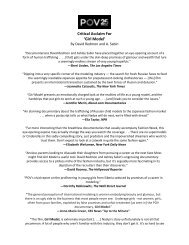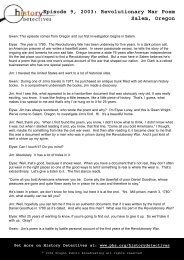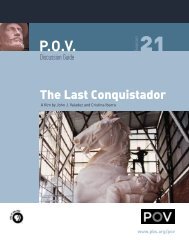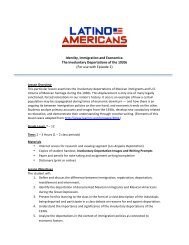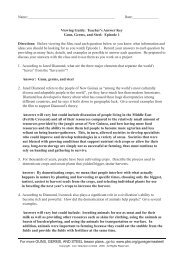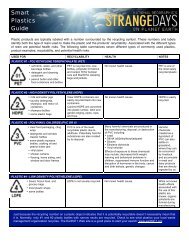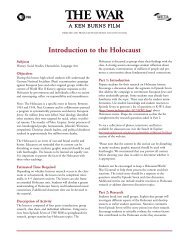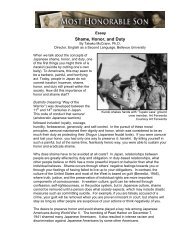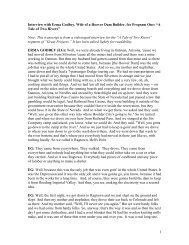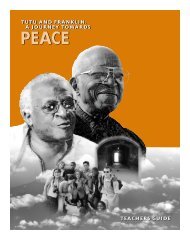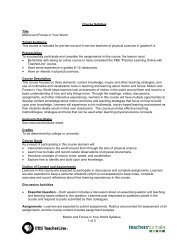DG - Inheritance - PBS
DG - Inheritance - PBS
DG - Inheritance - PBS
Create successful ePaper yourself
Turn your PDF publications into a flip-book with our unique Google optimized e-Paper software.
P.O.V.Discussion GuideSeason21<strong>Inheritance</strong>A film by James Mollwww.pbs.org/pov
Discussion Guide | <strong>Inheritance</strong>Letter from the FilmmakerSeason21LOS ANGELES, 2008Dear Colleague,In the winter of 2003, I first contacted Monika Hertwig, thedaughter of Amon Goeth, to ask for her permission to usephotographs of her father in a documentary we were producingfor the 10th-anniversary Schindler’s List DVD release. Frankly, Ididn’t know what to expect from Monika, but I was certainlysurprised that she spoke such perfect English. When I told herso, she laughed and explained that her first boyfriend wasAmerican. She was charming. Friendly. Easy to talk to. Monikaand I had a very pleasant conversation, and she gave herconsent to use the photographs.Then suddenly, Monika surprised me with a statementcompletely off the subject. She said, “I am not my father.” Iimmediately got chills. That seemingly small commentweighted with massive implication triggered a turning point inour conversation.What struck me in that moment was her need to declare, to atotal stranger, that she was not in any way responsible for theactions of her father, a man who murdered thousands ofinnocent people. The more I thought about her comment, themore it fascinated me. It stayed with me. It was the first timethat I stopped and thought about what it might be like to be thechild of someone capable of such blatant inhumanity and,consequently, the burden that Monika must carry.“I am not my father.” That one statement became the genesis of<strong>Inheritance</strong>.From further conversations with Monika, I learned more aboutthis legacy left to her by her father. Her honesty wasJames Moll, director/editor of the feature documentary <strong>Inheritance</strong>.compelling. She told me that after watching Ralph Fiennes’sPhoto courtesy of Alan Mercerportrayal of her father in Schindler’s List, she “hated” StevenSpielberg. Witnessing the representations of her father andmother in the film deeply disturbed Monika; she left the theater feeling distressed and unsettled. Ultimately, Monika’s shamebecame the catalyst for her quest to understand the truth about her family and reconcile the legacy she had no choice but to inherit.During that same period in 2003, I attended an event celebrating the Shoah Foundation’s 10th anniversary and met Helen Jonas, asurvivor of the Plaszow Concentration Camp. Helen is a Schindler survivor, and her testimony was featured in Voices from the List,© American Documentary, Inc.2
Discussion Guide | <strong>Inheritance</strong>Letter from the FilmmakerSeason21the documentary we produced for the Schindler’sList DVD. Her story is remarkable. She lived,enslaved, as Amon Goeth’s housemaid in the villahe shared with Ruth Kalder, Monika’s mother,during his command over Plaszow.While speaking with Helen that day, I mentionedmy conversation with Monika. But Helen clearlydidn’t want to hear anything about Monika. Shedidn’t want to hear the name “Goeth.” Later,however, Helen took me aside and quietly saidshe’d like to continue the conversation.Obviously, we did.Monika knew of Helen from a very early age.Growing up, Monika listened to her mother’sstories about Amon Goeth’s villa at CampPlaszow and her memories of Helen. Because ofthis, Monika felt a connection to Helen. Monikareached out to Helen as part of reconciling herpast and asked Helen if they could meet.Helen was extremely reluctant to meet Monika.Director/Editor James Moll, and Cinematographer Harris Donefilming for the feature documentary <strong>Inheritance</strong>.Photo courtesy of Don HoltzUnderstandably, she felt conflicted aboutreturning to the villa for the first time and meeting the daughter of a man who caused such an infinite amount of pain in her life. Inan unscheduled on-camera interview after their meeting, I learned of a secret Helen had carried for years, giving greaterperspective in understanding Helen’s trepidation in meeting Monika. But in the end, Helen told me her responsibility as a parentand grandparent persuaded her to accept Monika’s invitation to meet, for the first time, at the Plaszow Concentration Camp.James Moll, Producer / Director / Editor, <strong>Inheritance</strong>© American Documentary, Inc.3
Discussion Guide | <strong>Inheritance</strong>Table of ContentsSeason21Credits, Acknowledgments5 Introduction6 Background Information6 Plaszow Concentration Camp7 Amon Goeth8 People Featured in <strong>Inheritance</strong>11 General Discussion Questions12 Discussion Prompts15 Taking Action16 Resources21 How to Buy the FilmWriterFaith Rogow, PhDInsighters Educational ConsultingResearch EditorDaniel McDermonGuide Producers, P.O.V.Eliza LichtDirector, Community Engagement and Education, P.O.V.Jessica LeeOutreach and Development Coordinator, P.O.V.Irene VillaseñorYouth Views Manager, P.O.V.Design: Rafael JiménezCopy Editor: Joan D. SaundersSpecial thanks to:James Moll, DirectorThe Museum of Jewish Heritage-A Living Memorial to the HolocaustThe National World War II Museum - New Orleans© American Documentary, Inc.4
Discussion Guide | <strong>Inheritance</strong>IntroductionSeason21<strong>Inheritance</strong> is a feature-length (75-minute) film about theextraordinary, gut-wrenching and enduring effects of Nazihorrors on human souls. The Schindler’s List portrayal of thePlaszow Concentration Camp and its brutal commander, AmonGoeth, set in motion the events recounted by this newdocumentary. <strong>Inheritance</strong> tells the stories of two women withvery different scars from the World War II genocide of Europe’sJews — whose sorrows and angers intersect in the hauntingmemory of one man.Now in her 60s, Monika Hertwig has struggled a lifetime withwhat she learned at age 11 — that her father, Amon Goeth, hadnot been killed in World War II like other soldiers, but washanged as a war criminal when she was a baby.In her struggle to learn more about the crimes her fathercommitted during World War II, Hertwig seeks out Helen Jonas,who was selected by Goeth to serve in his household. She is oneof the few living eyewitnesses to his unspeakable brutality. TheMonika Hertwig, daughter of Nazi commander Amon Goeth,places a candle at the Jewish monument at thePlaszow Concentration Camp.Photo courtesy of Don Holtzwomen’s emotional meeting unearths terrible truths andlingering questions about how the actions of parents cancontinue to ripple through generations. It challenges viewers toconfront the ways in which atrocities reach deep into humansouls to define people for a lifetime.As an outreach tool, <strong>Inheritance</strong>’s account will push viewers toacknowledge the links between prejudice and violence while itsfocus on the personal will leave them with a sense of hope,arising from the human capacity to live with even the ugliest ofemotional and physical scars. Through its connection of pastand present, this documentary can serve as a powerfulspringboard for discussions about the ways in which historylives on in every human psyche.© American Documentary, Inc.5
Discussion Guide | <strong>Inheritance</strong>Background InformationSeason21Plaszow Concentration CampPlaszow, near the city of Krakow, Poland, was created as aforced-labor camp in 1942. Jews, Poles and other“undesirables” were obligated to work in the camp’s factories.The camp was established on the sites of two Jewishcemeteries and other property that belonged to the Jewishcommunity. In 1944, the camp reached its largest size, covering200 acres. A 2.5-mile-long electrified barbed-wire fencesurrounded the perimeter.The camp’s population fluctuated greatly during its operation.At its peak, it held more than 20,000 prisoners. Among themwere Jews from Hungary and thousands of ethnic Poles whohad been found guilty of disciplinary or political violations. In1944, as the war went on, Plaszow became a full-fledgedconcentration camp. Mass killings became routine. More than8,000 people were murdered there, mostly shot to death bysoldiers.German industrialist Oskar Schindler employed Plaszowprisoners in his enamelware factory and acted on behalf of hisworkers to protect them from extermination. He relocated themto a labor camp in what is now the Czech Republic, where theyremained until the end of the war. His actions saved more than1,000 people from deportation to the extermination camps.Schindler was later recognized by Yad Vashem, the IsraeliHolocaust Remembrance Authority, for his efforts.When Soviet forces marched toward Krakow in the summer of1944, the German SS (short for Schutzstaffel, “ProtectiveSquadron”) began to remove prisoners from Plaszow and shipthem to Auschwitz-Birkenau to be killed. The Germans thentried to destroy any evidence of the mass murders at the campby exhuming corpses and burning them. In January 1945, theremaining Plaszow prisoners were sent to Auschwitz-Birkenau.Sources:“Plaszow,” Holocaust Encyclopedia, United States Holocaust Memorial Museum,www.ushmm.org/wlc/article.php?lang=en&ModuleId=10005301;“Plaszow,” The Holocaust-Concise Encyclopedia, Yad Vashem,http://www1.yadvashem.org/education/entries/English/47.asp.A memorial at the site of the former Plaszow Concentration Camp inKrakow, Poland.Photo courtesy of Don Holtz© American Documentary, Inc.6
Discussion Guide | <strong>Inheritance</strong>Background InformationSeason21Amon GoethBorn in Vienna in 1908, Amon Goeth was a committed anti-Semite and early supporter of Hitler, having joined the Nazicause in 1932. He later served in the SS. Goeth’s first majorcommand centered on the final removal of the remainingJewish population of Krakow, Poland. In 1943 he became thecommandant of the Plaszow Concentration Camp. Amid theoverarching brutality of the Holocaust, Goeth was noted forwanton acts of cruelty. Survivors of Plaszow describe Goeth asparticularly brutal, routinely committing needless acts ofcruelty and abuse, even shooting prisoners at random from thebalcony of his villa.Portrait of Amon Goeth.Photo courtesy of Monika HertwigSources:“Goeth, Amon Leopold,” Yad Vashem,www1.yadvashem.org/odot_pdf/Microsoft%20Word%20-%206310.pdf;“Shared Present Helps Ease Survivors’ Painful Past,” The New York Times,September 24, 2007. www.nytimes.com/2007/09/24/nyregion/24survivors.html.After the war ended, Goeth was tried in Poland and found guiltyof murdering tens of thousands of people. He was executed onSeptember 13, 1946.© American Documentary, Inc.7
Discussion Guide | <strong>Inheritance</strong>Background InformationSeason21People Featured in <strong>Inheritance</strong>MONIKA HERTWIGBorn in 1945 (after the liberation of Camp Plaszow) and raisedin a small town in West Germany, Monika is the child of AmonGoeth and his mistress, Ruth Kalder. An infant when her fatherwas executed, Monika was raised by her mother and maternalgrandmother. She was told that like thousands of German men,her father had died in the war as a patriotic soldier. At age 11she finally discovered the truth, when her grandmotherexplained that her father was executed for his role in theextermination of Jews. Monika would not come to realize thefull power of that truth until she saw the 1993 Steven Spielbergfilm Schindler’s List, which featured the forced labor camp atMonika Hertwig, daughter of former Nazi commander, Amon Goeth.Photo courtesy of Don HoltzPlaszow and its sadistic commandant. By then, she wasmarried to Reinhard Hertwig and had raised her own child.After seeing a news documentary in which Helen Jonas, asurvivor of Plaszow, appeared, Hertwig decided to contact her.Now retired after working as a university administrator,Hertwig spends her time caring for her young grandson, David,and working to educate young people about the history of theHolocaust.© American Documentary, Inc.8
Discussion Guide | <strong>Inheritance</strong>Background InformationSeason21HELEN JONASBorn in 1925, Helena Sternlicht spent her childhood in Krakow,Poland. A teen when Hitler came to power in Germany, shewould eventually see much of her family destroyed by theHolocaust. Her father was taken away in the early days of theNazi takeover of Krakow; never to be seen again. In 1942, alongwith the rest of her immediate family, Helen was imprisoned inPlaszow Concentration Camp, where she was forced to work asa house servant for the camp commandant, Amon Goeth.Helen’s mother was killed in the camp, but Helen and hersisters were among the prisoners at Plaszow who were savedthrough the intervention of Oskar Schindler.Helen Jonas, a survivor of the Holocaust who lived under AmonGoeth's rule in his villa at the Plaszow Concentration Camp.Photo courtesy of Don HoltzHelen met her first husband, Joseph Jonas, two days after theliberation of their camp in what is now the Czech Republic. Theymarried at a displacement camp in Austria. The couple came tothe United States in 1947 and lived in the Bronx, where theyraised three children. One of those children, Vivian,accompanied Helen on her pilgrimage to Camp Plaszow.Joseph committed suicide in 1980. Today she devotes her timeto her family, volunteering on behalf of Israeli charities andspeaking about the history of the Holocaust.© American Documentary, Inc.9
Discussion Guide | <strong>Inheritance</strong>Background InformationSeason21VIVIAN JONAS DELMANVivian has been a registered dietitian and nutritionist for thepast 30 years and holds a master’s degree in clinicalcounseling. She has had a private practice in Jericho, New York,for the past 15 years; she specializes in eating disorders,medical conditions and sports nutrition.As a child of Holocaust survivors, Vivian has spoken about herparent’s experiences, at her synagogue on Kristalnacht and atthe Holocaust and Tolerance Center of Nassau County in GlenCove, New York, where she participated in a special program forteachers.Vivian plans to continue to share her parents’ experiences in thehope that people will not forget what happened during theHolocaust and to help promote tolerance.Vivian Jonas Delman, Helen's daughter.Photo courtesy of Vivian Jonas DelmanShe has been married to Dr. David Delman for the past 24 yearsand is a mother of two, Josh, age 20, and Ariel, age 19, both incollege.Sources:“Holocaust Survivor, Nazi’s Daughter Meet,” The Jerusalem Post, July 5, 2006,www.jpost.com/servlet/Satellite?pagename=JPost%2FJPArticle%2FShowFull&cid=1150885922939;“Nazi’s Child, Victim Share an ‘<strong>Inheritance</strong>,’” Jewish Journal.com, June 16, 2006,www.jewishjournal.com/arts/article/nazis_child_victim_share_inheritance_20060616.© American Documentary, Inc.10
Discussion Guide | <strong>Inheritance</strong>General Discussion QuestionsSeason21Immediately after the film, you may want to give people afew quiet moments to reflect on what they have seen. If themood seems tense, you can pose a general question and givepeople some time to themselves to jot down or think abouttheir answers before opening the discussion.Unless you think participants are so uncomfortable that theycan’t engage until they have had a break, don’t encouragepeople to leave the room between the film and thediscussion. If you save your break for an appropriatemoment during the discussion, you won’t lose the feeling ofthe film as you begin your dialogue.One way to get a discussion going is to pose a generalquestion such as:• If you could ask anyone in the film a single question,who would you ask and what would you ask him or her?• Who did you most relate to in this film?• What did you learn from this film? What insights did itprovide?• Describe a moment or scene in the film that you foundparticularly disturbing or moving. What was it aboutthat scene that was especially compelling for you?• Can the themes and lessons of the film relate tosubjects other than the Holocaust?© American Documentary, Inc.11
Discussion Guide | <strong>Inheritance</strong>Discussion PromptsSeason21Recognizing the Legacy• In your view, what did Monika learn from Helen? What didHelen and/or Vivian learn from Monika?• Neither Helen’s children nor Monika’s grandson directlyexperienced the Holocaust. Do you think they have inheritedsome sort of legacy from their families? If so, how would youdescribe the legacy they have received?• Monika starts the film by saying, “Every father who is in awar should think about his children … they will never live anormal life.” Is the legacy of war the same as the legacy ofatrocity? What can soldiers today do to ensure that they leavetheir children a positive legacy?Holocaust survivor Helen Jonas reads a letter from Monika Hertwig,daughter of Plaszow concentration camp Amon Goeth.Photo courtesy of Don HoltzUnderstanding Atrocity• How is the experience that Helen describes like or unlikeother atrocities you know about? Are there patterns you noticethat facilitate or impede the commission of atrocities?• Monika’s mother, Ruth, lived in the villa, but according toHelen, “She covered her eyes through all that was happening.”What is the role of denial by bystanders in the commission ofatrocities? In your view, should bystanders like Ruth be heldaccountable in any way for the crimes they witnessed but didnot themselves commit? How might a bystander make© American Documentary, Inc.12
Discussion Guide | <strong>Inheritance</strong>Discussion PromptsSeason21amends? How does the availability of instant global mediachange the notion of what it means to be a bystander? Can youthink of current examples of people not seeing what they don’twant to know?A memorial at the site of the former PlaszowConcentration Camp in Krakow, Poland.Photo courtesy of Don Holtz• Monika states, “I still don’t understand how an educatedperson like my father could believe in the Nazi point of view.”What would you say to her?• Helen asks, “Do you think something happened to him asa young man, that somebody did something to him, that he wasso evil? Why, when he hit me, he stood there so content?” Whymight Helen have suspected that her tormenter had, himself,been tormented? What might the role of childhood trauma orabuse be in atrocities committed for “political” reasons?Responding to Atrocity• The trio visits the monument to Camp Plaszow’s past. Ifyou were to design a monument, what would it look like? Whatwould you want people to remember about Plaszow or theHolocaust?• Monika says that as a child, she didn’t know any Jews,which made it easy for her not to think about them or to believewhat she was told. After an attempted genocide, what kind ofresponsibility do perpetrators or their descendants have to© American Documentary, Inc.13
Discussion Guide | <strong>Inheritance</strong>Discussion PromptsSeason21teach about the people or cultures they destroyed? How mightsuch responsibilities be applied to other genocides (NativeAmericans, Cambodians, Rwandans, Bosnians)? What roledoes that kind of teaching play in healing and reconciliation?• Helen says, “We just can’t be silent. We just can’t pushthings away.” What role does remembering the past play inpreventing future atrocities? Why might it be important to hearabout that past from survivors and not just from historians orgovernments? What are people in your community doing topreserve testimony from survivors of the Holocaust or othergenocides?• Monika’s initial reaction to the film Schindler’s List wasnegative: “I started to hate Spielberg. … Spielberg told me thetruth, and for telling me the truth, I attacked him.” Can youthink of instances when you have seen or learned about “truthtellers”who were the targets of hate? What could you do tosupport “truth-tellers” in your community?• Helen is glad that Amon Goeth was executed, but shethinks he got off easy given the cruelty of his acts. In your view,is the death penalty an appropriate punishment for defendantswho have been convicted of crimes against humanity? Why orwhy not?• Helen reacts with anger when Monika says that as a childshe was taught that Jews were killed because of sanitaryissues. Helen tells her, “They had to have some kind of excuse.”She also said, “Let’s just stop thinking that way. It’s bad. It’sdangerous.” Did Helen and Monika understand each others’viewpoints? Do you believe there was a disconnect in theircommunication? Why would repeating myths about Jews orother groups targeted for genocide be “dangerous”? Whatstereotypes have you encountered about these communities?How did you respond? What would you do if you heard someoneexpress these stereotypes today?• Helen understands that Monika knows that Jews werekilled only “because they were Jews,” yet she insists Monika notrepeat other excuses for the slaughter because even thoughMonika knows, others may not. Prior to viewing this film, whatdid you know about the Nazi extermination of Jews? In yourview, is it important for this history to be taught in AmericanMonika Hertwig and Helen Jonas visit Amon Goeth's villa at the siteof the former Plaszow Concentration Camp in Krakow, Poland,where Helen was enslaved during WWII. Vivian Delman,Helen's daughter, joins them.Photo courtesy of Don Holtzschools? Why or why not? Who benefits and who is hurt bydenials that the Holocaust happened?• Monika says that she is teaching her grandson that“everybody’s the same. It doesn’t matter in what religion youbelieve. It doesn’t matter if you are black or white.” Do youagree? Why or why not? What is the difference betweenteaching that everyone is “the same” and teaching thateveryone deserves respect or that everyone has the right toequal treatment under the law?© American Documentary, Inc.14
Discussion Guide | <strong>Inheritance</strong>Taking ActionSeason21• There is a Jewish tradition of writing an Ethical Will, adocument that spells out the values you hold dear and by whichyou hope your children live. The document creates a legacy ofvalues rather than a legacy of property. Write an Ethical Will forfuture generations and share it with your loved ones or yourcommunity.• Provide ways in your community for survivors of genocideto share their stories.• Join with people or organizations in your community thatare engaged in anti-bias education or in combating prejudice orhate.• Create local opportunities for reconciliation, for example,special religious services focused on reconciliation or healingMonika Hertwig says good-bye to her grandson and husbandbefore departing to meet Helen Jonas at the Plaszowconcentration camp in Poland.Photo courtesy of Don Holtzcommunity rifts, government declarations of apology, mediatedmeetings between segments of the community in conflict, andso on.• Find out what your local school district teaches aboutWorld War II and the Nazi genocide of Jews, Gypsies, gaypeople, people with disabilities, and others. Work with teachersand administrators to teach about the lasting impact ofgenocide on the descendants of perpetrators as well as victims.© American Documentary, Inc.15
Discussion Guide | <strong>Inheritance</strong>ResourcesSeason21FILM-RELATED WEB SITESOriginal Online Content on P.O.V. Interactive(www.pbs.org/pov)P.O.V.’s <strong>Inheritance</strong> companion websitewww.pbs.org/pov/inheritanceThe companion website to <strong>Inheritance</strong> offers exclusivestreaming video clips from the film, a podcast version of thefilmmaker interview and a wealth of additional resources,including a Q&A with the filmmaker, ample opportunities forviewers to “talk back” and talk to each other about the film, andthe following special features:Q&A: A DAUGHTER'S POINT OF VIEWVivian Delman, Helen Jonas's daughter, discusses herexperience growing up as the child of a Holocaustsurvivor.PHOTO GALLERY: PLASZOW FORCED LABOR CAMPThe Plaszow Camp was initially established as a forcedlabor camp in 1942 in Krakow, Poland. Under Nazicommandant Amon Goeth, thousands of people werekilled there.Websites Related to the FilmALLENTOWN PRODUCTIONSwww.<strong>Inheritance</strong>Documentary.comVisit the filmmaker’s website and browse the gallery,production bios, the press kit and other features related to<strong>Inheritance</strong>.What’s Your P.O.V.?P.O.V.’s online Talking Back Tapestry is a colorful,interactive representation of your feelings about<strong>Inheritance</strong> .Listen to other P.O.V. viewers talk about the filmand add your thoughts by calling 1-800-688-4768.www.pbs.org/pov/talkingback.htmlTHE NEW YORK TIMES:“THE STOWAWAY ON SCHINDLER’S LIST”www.nytimes.comMimi Reinhard typed an important version of the manifest ofprisoners bound for Oskar Schindler’s munitions factory andadded her name to the list, along with two friends, saving theirlives. (December 2, 2007)THE NEW YORK TIMES: “SHARED PRESENT HELPS EASESURVIVORS’ PAINFUL PAST”www.nytimes.comHelen Jonas and members of the New Cracow FriendshipSociety share their thoughts as they preview the film<strong>Inheritance</strong>. (September 24, 2007)TIME: “THE MAN BEHIND THE MONSTER”www.time.comActor Ralph Fiennes portrayed Amon Goeth in the 1993 filmSchindler’s List; in this interview with Time magazine, hedescribes how he managed to perform such a difficult role.(February 21, 1994)OSKAR SCHINDLERwww.oskarschindler.comThis website honors Oskar Schindler, the man who saved morethan 1,000 Jews from death in concentration camps duringWorld War II. Site visitors can learn more about his life beforeand after the war and browse the entire list of names of thepeople he saved.© American Documentary, Inc.16
Discussion Guide | <strong>Inheritance</strong>ResourcesSeason21Holocaust History and World War II HistoryAKTION REINHARD CAMPSwww.deathcamps.orgIndependent Holocaust scholars designed this site to providegeneral information about the Plaszow Concentration Campand others like it. The site also links to a wide range of otherHolocaust history sites.THE MUSEUM OF JEWISH HERITAGE -A LIVING MEMORIAL TO THE HOLOCAUSTwww.mjhnyc.orgThe Museum of Jewish Heritage serves as a living memorial tothose who perished during the Holocaust and affirms theJewish community that is their legacy today. Visitors to themuseum’s website can learn more about the survivors registry,JewishGen, a virtual community centered on discoveringJewish roots and ancestry, and discover ways to honorHolocaust remembrance.U.S. HOLOCAUST MEMORIAL MUSEUMwww.ushmm.orgThe website of the U.S. Holocaust Memorial Museum hasresources for the general public and educators interested in thedocumentation, study and interpretation of history related tothe Holocaust. Documents are available in Spanish and Frenchas well.USC SHOAH FOUNDATION INSTITUTEhttp://college.usc.edu/vhi/This website for Steven Spielberg’s Shoah Foundation, housedat the University of Southern California, includes more than52,000 videotaped testimonials from survivors, including HelenJonas. The website can be viewed in Czech, Spanish, Croatian,Polish, Russian, Slovak and Ukrainian.VOICE/VISION HOLOCAUST SURVIVORORAL HISTORY ARCHIVEhttp://holocaust.umd.umich.edu/interviews.phpThis searchable archive from the University of Michigan atDearborn offers oral histories from survivors in variousformats, including several that describe the PlaszowConcentration Camp and Amon Goeth.THE NATIONAL WORLD WAR II MUSEUMwww.nationalww2museum.orgThis website offers information about the museum’s generaland special exhibits, provides resources for educators, and hasan interactive timeline, along with a glossary, that details WorldWar II history.Prejudice and Anti-SemitismANTI-DEFAMATION LEAGUEwww.adl.orgThe Anti-Defamation League provides resources specificallyfocused on anti-Semitism and all forms of bigotry in the UnitedStates and abroad. The site offers information about extremismand international affairs in the context of civil rights and humanrelations.FACING HISTORY AND OURSELVESwww.facinghistory.orgFacing History and Ourselves delivers classroom strategies,resources and lessons that inspire young people to takeresponsibility for their world. The organization’s websiteincludes its famous resource book about the Holocaust andhuman behavior.TEACHING TOLERANCE: SOUTHERN POVERTY LAW CENTERwww.tolerance.orgThe website of the Teaching Tolerance project of the SouthernPoverty Law Center features anti-bias education resources forteachers and parents.© American Documentary, Inc.17
Discussion Guide | <strong>Inheritance</strong>ResourcesSeason21Human Rights / GenocideANTI-GENOCIDE HOTLINEwww.1800genocide.comThis hotline was created by the Genocide Intervention Networkand connects callers directly to their elected officials so theycan voice their concerns about the genocide in Darfur. Updatesand talking points are also available.Several Jewish organizations have been especially active inopposing the current genocide in Darfur, including theAmerican Jewish World Service (www.ajws.org) and the ElieWiesel Foundation (www.eliewieselfoundation.org).BBC HISTORY: WORLD WARS: GENOCIDEwww.bbc.co.uk/history/worldwars/genocide/The BBC History website is dedicated to programs and contentthat reflect and report on world history. The website has asection that offers extension information about the Holocaustas well as articles about issues related to the Holocaust writtenby different scholars.GENOCIDE STUDIES PROGRAMwww.yale.edu/gsp/The Genocide Studies program at Yale University’s MacMillanCenter for International and Area Studies(www.yale.edu/macmillan/flash.htm) conducts research andholds seminars and conferences on comparative, interdisciplinaryand policy issues relating to the phenomenon ofgenocide and has provided training to researchers fromafflicted regions.WEB GENOCIDE DOCUMENTATION CENTREwww.ess.uwe.ac.uk/WCC/goeth.htmDr. Stuart D. Stein of the University of West England maintainsthis website, which houses collections of documents that relateto genocide, mass killings and war crimes. This link directsusers to a republished account of Amon Goeth’s trial from theU.N. War Crimes Commission, Volume VII, London, HMSO, 1948.Survivor NetworksTHE BENJAMIN AND VLADKA MEED REGISTRY OF HOLO-CAUST SURVIVORSwww.ushmm.org/remembrance/registry/Hosted by the U.S. Holocaust Museum website, the MeedRegistry hopes to track and commemorate all those whosurvived Nazi persecution.NEW CRACOW FRIENDSHIP SOCIETYwww.newcracowfriendshipsoc.org/The New Cracow Friendship Society is a Holocaust survivornetwork that seeks to unite survivors from Krakow, Poland, andsurrounding areas.TOGETHER: THE AMERICAN SOCIETY OF JEWISH HOLO-CAUST SURVIVORS AND THEIR DESCENDANTSwww.americangathering.com/Founded in 1983, this organization offers a registry, anewsletter, information on restitution and other services forthose who resettled in America after the Holocaust.GENOCIDE WATCHwww.genocidewatch.orgGenocide Watch seeks to raise awareness and influence publicpolicy concerning potential and actual genocide.HUMAN RIGHTS WATCHwww.hrw.orgThe website for the Human Rights Watch offers perspectivesand history about global human rights abuses.© American Documentary, Inc.18
Discussion Guide | <strong>Inheritance</strong>ResourcesSeason21NPR and <strong>PBS</strong>NPRTHE BRYANT PARK PROJECT: “NAZI ARCHIVE GOES PUBLIC”www.npr.orgSome 47 million documents on the Nazi Holocaust are beingmade public by the International Committee of the Red Cross.They’d been kept private in Germany to protect the Holocaustvictims. (November 29, 2007)DAY TO DAY: “WWII GHETTO WORKERS ELIGIBLEFOR REPARATIONS”www.npr.orgAfter more than 60 years, Holocaust survivors who worked inGerman-controlled ghettos during World War II may be eligiblefor a reparation payment by the German government. (July 22,2008)FRESH AIR: “DID ARABS SAVE JEWS DURINGWORLD WAR II?”www.npr.orgAuthor and historian Robert Satloff discusses his book Amongthe Righteous: Lost Stories from the Holocaust’s Long Reach intoArab Lands. (October 5, 2007)MORNING EDITION: “HOLOCAUST SURVIVORS HONOR CAMPLIBERATOR”www.npr.orgSIMON SAYS: “THE LETTERS OF OTTO FRANK”www.npr.orgAnne Frank’s diary is familiar to many. Now, the release ofletters written by her father reveals more about the family’sattempt to flee to the United States during World War II. TheFranks went into hiding after being denied visas to America.(February 17, 2007)TALK OF THE NATION: “THE POLITICS OF HOLOCAUST DENIAL”www.npr.orgThis week, Iran hosted an international conference questioningthe Holocaust. It met with outrage from much of the world andraised questions about the goals of such an event. (December14, 2006)WEEKEND EDITION: “EUROPE GRAPPLES WITH NAZI PAST”www.npr.orgSylvia Poggioli comments on how after more than 60 years,Europe still has difficulty coming to terms with the Nazi past.(September 24, 2006)WEEKEND EDITION: “REMEMBERING THE HORRORSOF DACHAU”www.npr.orgSeventy-five years ago, Nazi police chief Heinrich Himmlerannounced the opening of the first Nazi concentration camp forpolitical prisoners, ushering in one of the most tragic chaptersin modern history. (March 30, 2008)Holocaust survivors reunite with liberator Vernon Tott and visitthe site of the Ahlem Concentration Camp. (September 25, 2007)MORNING EDITION: “HOLOCAUST SURVIVORS REUNITED, 65YEARS LATER”www.npr.orgA brother and sister separated during the Holocaust have beenreunited after 65 years, brought together by researchers fromIsrael’s Yad Vashem Museum. Each had believed the other to bedead. (September 26, 2006)© American Documentary, Inc.19
Discussion Guide | <strong>Inheritance</strong>HeadlineSeason21<strong>PBS</strong>AMERICAN EXPERIENCE: AMERICA AND THE HOLOCAUSTwww.pbs.org/wgbh/amex/holocaustAmerica and the Holocaust uses the moving tale of Kurt Klein’sstruggles against a wall of bureaucracy to free his parents toexplore the complex social and political factors that led theAmerican government to turn its back on the plight of the Jews.AUSCHWITZ: INSIDE THE NAZI STATEwww.pbs.org/auschwitzThis six-part series looks at the historical context leading up tothe creation of Auschwitz and chronicles the camp’s operationsup to the trial of its SS leaders.DARING TO RESISTwww.pbs.org/daringtoresistIn Daring to Resist, three Jewish women reflect on their lives asteenagers in Holland, Hungary and Poland during World War IIwhen they refused to remain passive in the face of theHolocaust. Home movies and never-before-publishedphotographs enrich their stories of resisting in courageous andunexpected ways.NOVA: HOLOCAUST ON TRIALwww.pbs.org/wgbh/nova/holocaustThe companion website to this film uses a celebrated recenttrial as a springboard to examine and successfully challengethe notion of Holocaust denial.RELIGION AND ETHICS: “GERMANS AND THE HOLOCAUST”www.pbs.org/wnet/religionandethicsReligion and Ethics reports on the revival of anti-Semitism inGermany. After 60 years of remembering the horror of the NaziHolocaust, of creating memorials to the Jews who died and ofpaying reparations to Israel, some Germans — some of themneo-Nazis — are saying, “Enough apologizing.”WORLD WAR II ON <strong>PBS</strong>www.pbs.org/wwii/holocaust.htmlThis <strong>PBS</strong> website hosts links to numerous Holocaust-relatedmaterials, including excerpts from Nazi leader JosephGoebbels’s diary, a link to Frontline’s investigation ofSwitzerland’s role as banker and financial broker for NaziGermany, and classroom resources.THE JEWISH AMERICANSwww.pbs.org/jewishamericansThis series on <strong>PBS</strong> explores 350 years of Jewish Americanhistory and has a host of links to information about Jews andassimilation, anti-Semitism, political activism, the Holocaust,and more.NOT IN OUR TOWNwww.pbs.org/niotThis national campaign’s website aggregates many usefulresources for communities wanting to take action against hate.© American Documentary, Inc.20
Discussion Guide | <strong>Inheritance</strong>How to Buy the FilmSeason21To order <strong>Inheritance</strong>, go to www.allentownproductions.com/projects/inheritance.Produced by American Documentary, Inc. andentering its 21st season on <strong>PBS</strong>, the awardwinningP.O.V. series is the longest-running serieson television to feature the work of America’s best contemporary-issueindependent filmmakers. Airing Tuesdays at 10 p.m., June throughOctober, with primetime specials during the year, P.O.V. has broughtmore than 250 award-winning documentaries to millions nationwideand now has a Webby Award–winning online series, P.O.V.’s Borders.Since 1988, P.O.V. has pioneered the art of presentation and outreachusing independent nonfiction media to build new communities inconversation around today’s most pressing social issues. Moreinformation about P.O.V. is available online at www.pbs.org/pov.Major funding for P.O.V. is provided by <strong>PBS</strong>, The John D. and CatherineT. MacArthur Foundation, National Endowment for the Arts, TheEducational Foundation of America, The Fledgling Fund, New York CityDepartment of Cultural Affairs, New York State Council on the Arts,Lower Manhattan Cultural Council, The September 11th Fund, andpublic television viewers. Funding for P.O.V.'s Diverse Voices Project isprovided by the Corporation for Public Broadcasting. P.O.V. is presentedby a consortium of public television stations, including KCET LosAngeles, WGBH Boston and Thirteen/WNET New York.P.O.V. Community Engagement and EducationP.O.V. provides Discussion Guides for all films as well as curriculumbasedP.O.V. Lesson Plans for select films to promote the use ofindependent media among varied constituencies. Available free online,these originally produced materials ensure the ongoing use of P.O.V.’sdocumentaries with educators, community workers, opinion leaders,and general audiences nationally. P.O.V. also works closely with localpublic-television stations to partner with local museums, libraries,schools, and community-based organizations to raise awareness of theissues in P.O.V.’s films.P.O.V. Interactivewww.pbs.org/povP.O.V.’s award-winning Web department produces a Web-onlyshowcase for interactive storytelling, P.O.V.’s Borders. It also producesa website for every P.O.V. presentation, extending the life of P.O.V. filmsthrough community-based and educational applications, focusing oninvolving viewers in activities, information and feedback on the issues.In addition, www.pbs.org/pov houses our unique Talking Back feature,filmmaker interviews, viewer resources and information on the P.O.V.archives as well as myriad special sites for previous P.O.V. broadcasts.American Documentary, Inc.www.americandocumentary.orgAmerican Documentary, Inc. (AmDoc) is a multimedia companydedicated to creating, identifying and presenting contemporary storiesthat express opinions and perspectives rarely featured in mainstreammediaoutlets. AmDoc is a catalyst for public culture, developingcollaborative strategic-engagement activities around socially relevantcontent on television, online and in community settings. These activitiesare designed to trigger action, from dialogue and feedback toeducational opportunities and community participation.Front cover: Monika Hertwig, daughter of Nazi commanderAmon Goeth, beside the villa at the Plaszow Concentration Campwhere her parents lived during WWII.Photo courtesy of Don HoltzThe See it On <strong>PBS</strong> logo is a trademark of the Public Broadcasting Service and is used with permission. All rights reserved.


